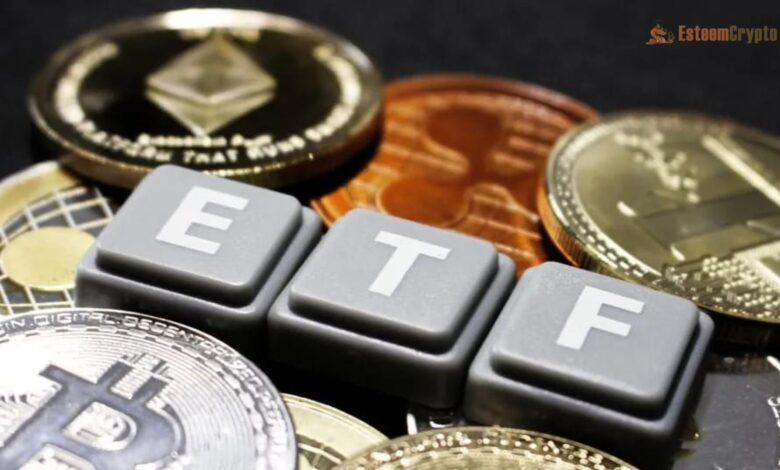Crypto ETF Trading: Navigating the New Frontier in Digital Assets

Crypto ETF Trading: The advent of crypto exchange-traded funds (ETFs) has signaled a major growth in the convergence between cryptocurrencies and traditional finance in recent years. By serving as a link between the chaotic world of cryptocurrencies and the organized, controlled setting of traditional stock markets, these financial products are completely changing the way investors can access and trade digital assets. This article examines the expansion of crypto ETF trading, its effects on the financial sector, and its implications for investors in 2024 and beyond.
Understanding Crypto ETFs
A crypto ETF is a type of investment fund and exchange-traded product that holds cryptocurrency assets or tracks the performance of a specific cryptocurrency or a basket of cryptocurrencies. Unlike direct investments in cryptocurrencies, where investors buy and hold digital coins in wallets, crypto ETFs allow investors to gain exposure to digital assets through the purchase of shares on traditional stock exchanges.
There are two main types of crypto ETFs: physical-backed ETFs and futures-based ETFs. Physical-backed ETFs hold the actual cryptocurrencies in their portfolio. For example, a Bitcoin ETF would hold actual Bitcoin as its underlying asset. On the other hand, futures-based ETFs track the price of cryptocurrency futures contracts rather than holding the underlying asset directly. Both types of ETFs provide investors with an opportunity to participate in the crypto market without the complexities and risks associated with directly managing digital assets.
The Growth of Crypto ETFs
The process of introducing crypto ETFs has been slow and frequently hampered by regulatory scrutiny and delays. But things started to change in 2021 when the U.S. Securities and Exchange Commission (SEC) approved the first Bitcoin futures exchange-traded fund (ETF). This was a huge turning point that opened the door for more financial products with a crypto component to hit the market.
The quantity of crypto ETFs has increased significantly since then. By 2024, there will be a wide range of ETFs available on the market to suit various risk tolerances and investing approaches. ETFs offering diverse exposure to the cryptocurrency market include those that track indices made up of several digital assets, such as those that concentrate on popular cryptocurrencies like Ethereum and Bitcoin.
Rising demand from institutional investors is one of the factors propelling the expansion of cryptocurrency exchange-traded funds (ETFs). Due to regulatory uncertainty and market volatility, big financial institutions were initially reluctant to engage directly in cryptocurrencies. However, these days, they are supporting crypto ETFs as a safer and more regulated approach to exposing themselves to digital assets. This change has caused large capital inflows into cryptocurrency exchange-traded funds (ETFs), increasing their appeal.
Advantages of Crypto ETFs
Crypto ETFs offer several advantages over direct investment in cryptocurrencies:
- Regulated Environment: One of the primary benefits of crypto ETFs is that they operate within a regulated framework, providing a level of oversight and investor protection that is often lacking in the cryptocurrency market.
- Ease of Access: Crypto ETFs are traded on traditional stock exchanges, making them accessible to a broader range of investors, including those who may not be familiar with the intricacies of the cryptocurrency market. Investors can buy and sell shares of crypto ETFs through their existing brokerage accounts, just like any other stock or ETF.
- Diversification: Some crypto ETFs offer diversified exposure to the cryptocurrency market by holding a basket of different digital assets. This diversification can help reduce the risk associated with investing in individual cryptocurrencies, which are known for their extreme price volatility.
- Liquidity: ETFs are generally more liquid than direct cryptocurrency investments, especially for large sums. This is because ETFs can be traded throughout the day on stock exchanges, providing investors with the flexibility to enter and exit positions quickly.
- Tax Efficiency: In some jurisdictions, investing in ETFs may offer tax advantages compared to directly holding cryptocurrencies. This is particularly relevant in countries where the sale of digital assets is subject to capital gains tax.
Challenges and Risks
Crypto ETFs have many advantages, but they also have challenges and risks. One of the main issues is cryptocurrencies’ fundamental volatility, which can cause large price fluctuations in shares of crypto exchange-traded funds. ETFs offer a safer and more regulated environment, but they are unable to eliminate the risks associated with the underlying assets completely.
Another difficulty is uncertainty in regulations. Countries have quite different licensing processes for cryptocurrency exchange-traded funds (ETFs), and authorities are still figuring out how best to monitor these instruments. The regulatory landscape in some areas is still hazy, which may affect the accessibility and uptake of these funds.
Another issue is market liquidity, particularly for exchange-traded funds (ETFs) that follow newer or less well-known cryptocurrencies. If the underlying assets lack sufficient liquidity, investors may incur greater trading expenses and wider bid-ask spreads.
The last risk is tracking error, which occurs when an ETF’s performance deviates from the performance of the index or underlying assets it is meant to track. This may happen for a number of reasons, including the influence of derivatives in futures-based ETFs and the expenses related to operating the ETF, such as transaction and maintenance fees.
The Future of Crypto ETF Trading
The future of crypto ETF trading looks promising, with continued growth expected in the coming years. As more countries approve crypto ETFs and the market matures, these products are likely to become staples in the portfolios of both retail and institutional investors.
Innovation in the crypto ETF space is also on the horizon. For instance, the development of DeFi (Decentralized Finance) ETFs could provide investors with exposure to a broader range of blockchain-based financial services, including lending, borrowing, and trading platforms. Additionally, as the cryptocurrency market evolves, we may see the introduction of ETFs that focus on specific sectors within the digital asset ecosystem, such as NFTs (Non-Fungible Tokens), metaverse projects, or blockchain infrastructure.
Moreover, integrating blockchain technology into the traditional financial system could further enhance the transparency and efficiency of crypto ETFs. For example, blockchain could be used to automate certain aspects of ETF management, such as tracking underlying assets and calculating net asset value (NAV), potentially reducing costs and improving accuracy.
Conclusion
The development of digital assets has advanced significantly with the introduction of crypto ETF trading. Crypto ETFs serve as a link between the emerging cryptocurrency market and the well-established realm of traditional finance. They provide a regulated, easily accessible, and possibly less hazardous means for investors to participate in the quickly expanding crypto sector.
Before purchasing crypto ETFs, investors should carefully weigh the risks and do extensive research, just like they would with any other investment. Even while it seems like the future of crypto ETF trading is bright, it is crucial to keep an open mind and approach this new frontier with caution. Crypto ETFs are probably going to get bigger in investors’ portfolios as the sector develops and more people try to take advantage of the opportunities that come with digital assets.




